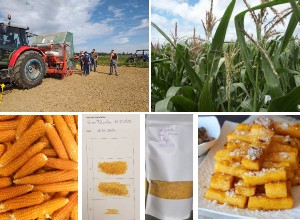Our research project: to build local economic sectors to human food, respectful of the environment and people, at a good price, and with a fair and equitable income for each actor. The example chosen is the construction of a short circuit for the marketing of Polenta semolina, ranging from the selection of a high quality maize variety adapted to the Ile de France, its processing, and its direct sale, including canteens. The model could then be applied to other products.

Participate in the 2025 pilot project!
-
Direct sale of Polenta semolina produced in 2024 on the Saclay plateau
-
Download our recipe. Polenta is a very low gluten cereal dish that is easy to cook and can be frozen. Rich in carotenoids, Marano semolina provides vitamin D precursors. Enough to prepare for winter!
-
Are you a farmer or market gardener and want to cultivate a few hectares of the Marano variety in the spring of 2026? Are you in charge of a school canteen and want to put polenta produced in a short circuit on your menu? Contact us!
Our Goals
-
Eat better: In 2024, half of children entering sixth form in middle school at Les Ulis are overweight. It is important to regain the taste and habit of consuming minimally processed products of good nutritional quality.
-
Building-up the ecological transition: Increasing the share of plant-based products in food, reducing the carbon footprint by building sectors food supply chains, find a food use for maize, a plant that contributes to the storage of carbon in soils and deserves to be conserved in the agricultural rotations.
-
Guarantee a fair and equitable income for the actors of the sector: Select varieties whoose seed can be produced on the farm. Rationalizing costs production, processing, distribution, taking into account the quality of life and the environmental footprint.
-
Involve all stakeholders from the start of the project: the selection criteria to achieve a high quality variety adapted to cultivation in the south of the Ile-de-France region and respecting the objectives of creating a short circuit food sector are jointly developed by all stakeholders in the value chain, including farmers and market gardeners, millers, consumers, associations, local authorities.
A rich partnership!
To implement a participatory approach involving all stakeholders, secure the means for production and selection, and define the objectives of varietal selection, the project relies on various partners. We obtained a funding from the Olga Tribalat Institute.
-
The team GQMS of the UMR GQE-Le Moulon has chosen from the collection of maize genetic resources, the Marano variety, on the basis of its robustness (resistance to lodging), its good vigour at the beginning of the cycle, its earliness (compatible with cultivation in the south of the Ile-de-France region) and its grain quality (high semolina yield and high content of beta-carotene-type pigments, which is of interest in human health and also has interests in the feed of laying hens and the quality of the egg yolk). She studies a short-cycle selection scheme based on the evaluation of sibling-offspring of crosses and the use of parental genotyping to predict the value of other crosses. The first selection cycle is based on maintaining the quality of the grains (on the vitrosity trait) and increasing the yield. Thanks to the Versailles-Saclay Experimental Unit, and in partnership with AgriObtention, it ensures the regular production of seeds from the latest selection cycles for making available to the market gardeners in charge of the evaluation.
-
The millers (Eudes Coutte (Champs et Papilles), Magali Rocheteau (Moulins de Rambouillet)), in conjunction with Christian Hubert (Huilerie de la Plaine de Versaille) collaborate with the BASE and GQMS teams of the UMR GQE-Le Moulon for the development of processing conditions and the establishment of production costs. The 2024 harvest made it possible to produce semi-coarse semolina on a stone mill at reasonable costs, to obtain about 70% semolina, 20% flour and 10% residues from one kilo of grains. Distributors are in charge of marketing products through AMAP contracts, direct sales, and contracts with catering companies. The objective is the complete processing of the product, and the obtaining of 80% semolina and 20% flour.
-
The teams of the Territorial Food Programme provide support for the quantification of demand at the territorial level, and in particular for school canteens. They contribute to the connection between the various players in the sector. They participate, in close collaboration with the UMR Sayfood, in defining the needs in terms of minimally processed maize-based products.
-
The Living-Lab Vivagrilab makes its resources available to the project to organize participatory workshops with different actors aiming, on the one hand, to define the expectations of farmers/market gardeners and their agronomic constraints (with the support of the Versailles-Saclay Experimental Unit) concerning production, and on the other hand, to evaluate the expectations and obstacles of consumers with regard to this type of processed products (sensory and nutritional properties). This last aspect will be led by the UMR SayFood.
-
The farmers and market gardeners of the VivagriLab territory are participating in the experiment with the aim of diversifying their production towards local production with a guaranteed income and integrating polenta maize plots into their rotations. They undertake to produce a certain volume each year, in exchange for guarantees on outlets. They participate in the collection of data on experimental seeds provided by the UMR GQE Le Moulon.
-
The UMR Sayfood coordinates, within the framework of the Vivagrilab, participatory workshops for the co-ideation and co-creation of the concepts of semolina or maize flour products in order to
-
Identify prototypes that meet consumer expectations while integrating farmers’ levers and constraints.
-
Explore the design of new maize-based products, including the bread-making of gluten-free products, or other uses of flours.
La polenta de Saclay en vente directe !
Our 2024 production is for direct sale
2.50 euros for a 500g bag of polenta semolina